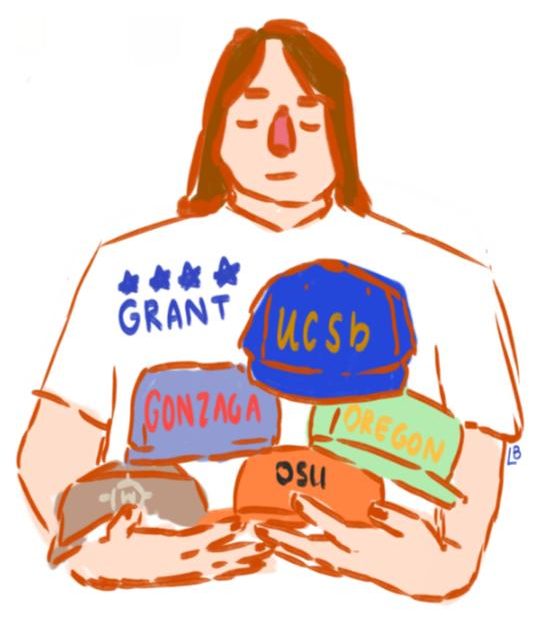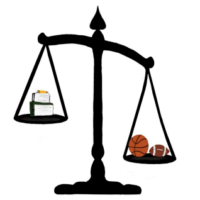
Can college athletic recruitment be more efficient? For many Grant athletes, playing a sport in college is something they’ve prepared for since first stepping onto the field, but making that dream a reality can be a challenge.
The recruitment process is often long and expensive. On average, it lasts from sophomore year to senior year. It can involve nutritionists, personalized workouts and scouring the internet for coaches’ contact information. This daunting process causes many families with college-bound athletes to seek out help through third party online resources, and Grant families are no exception; many Grant student athletes have, at the very least, created a free online profile for one of these services.
Students and coaches in the Grant community explained what recruiting looks like today, what role online recruiting services play and if paying for the resources they offer increases the likelihood of getting recruited to play in college.
Next College Student Athlete (NCSA) is a popular athletic recruitment service whose goal is to help athletes and their families navigate the college recruiting process. They often initially engage athletes with their free online profile, allowing them to be searchable on the website following the completion of an introductory phone consultation. During this call, an employee presents the benefits of the service and concludes by explaining NCSA’s three-tier pricing system for advanced support. The pricing for these tiers ranges from $1,320–4,200. The biggest draws to services like NCSA are their professionally-made highlight reel, the opportunity to become and remain more accessible to college coaches and the possibility of attaining a scholarship.
NCSA claims to “focus on helping student-athletes find the right college academically, athletically, socially and financially.” They have received an A + rating from the Better Business Bureau (BBB) and have a 4.84 out of five star customer rating on the BBB website.
Eliot Merrick, a Grant sophomore, says he heard about NCSA from some of his football teammates and downloaded the app after seeing it in the App Store. He drafted his free online profile and had a call lasting about one hour with an NCSA representative. During this call, the NCSA representative helped Merrick complete his online profile. The representative also helped Merrick understand how to use popular social media platforms like X, formerly known as Twitter, to attract prospective college coaches. Even though Merrick hasn’t chosen to purchase NCSA’s paid service yet, he has received one offer that he credits to the free profile he made and is considering using their advanced services beginning junior year as he gets closer to making a college decision. “If I pay the full price, I’ll probably get (more) offers,” says Merrick.
Many college coaches agree that the free profile is worth setting up. Some say they have used NCSA to cross-reference the athletes they were already interested in. To set up the free profile, NCSA asks for basic information and then deep dives into students’ athletic statistics. As soon as an athlete’s profile is live, they’re searchable to a plethora of college coaches. The company’s website claims 35,000 college coaches actively search NCSA profiles every year.
Coaches are less enthusiastic about the paid advanced services, however, and continue to use other recruiting methods. “I haven’t pulled up NCSA in two years,” says Randy Heath, a former Grant High School football coach and current Lewis and Clark College football coach. “We do enough front-end work by the time they’re a senior. We know who they are.”
Another selling point of NCSA is the professionally made highlight reel. Depending on the package, NCSA provides up to four highlight reels, one for every year of high school, that can be featured on a student’s profile. Coaches question the value of these paid advanced services. “You would be spending two grand on a highlight reel that I’m not gonna watch,” says Heath. “The highlights we get are done on Hudl.”
Hudl is a video-editing software that high school coaches can purchase for their whole team to use. In addition to providing analyzed film for teams to review, the software allows individuals to compile their own footage into a polished video that can be used for self promotion in the college recruiting process. Initially, Hudl was designed for football, but has since expanded to include soccer, basketball, volleyball and lacrosse.
The similarities between NCSA and Hudl are numerous. Both have a social media-like interface that provides opportunities for coaches to contact athletes directly through the site. With Hudl, however, an unlimited number of highlight reels can be made free of charge by simply importing film onto the site.
When asked if the ”average athlete” will benefit from NCSA and paid services like it, Heath says, “They’re selling a dream to kids who are never gonna play (in) college.”
When talking to Torey Smith, the George Fox assistant coach for tight ends, he says he can recognize emails sent from paid services seeking to get a mass amount of reels in front of college coaches on behalf of the athletes they represent. “This tells me the athlete is only interested in receiving offers and not interested in finding a school that fits their needs,” says.
However, Smith says the recruiting process is more nuanced than that: “We want the athletes to be interested in us just as much as we are interested in them. Specific intent is key to both the athlete’s and the school’s success. This is their future; it amazes me that athletes are treating it like an auction.”
For those who want to get seen and are serious about playing in college, there are much simpler ways to achieve this goal, like showcases or ID camps. “It allows the coach to get to know a kid and see what they’re doing on the field,” says Biniam Afenegus, former Clark College Head Men’s Soccer Coach and current Grant High School teacher.
“We like to see them live. We like to talk to them,” says Heath.
Showcases are commonly advertised and, normally, anyone can sign up. While there is a fee for most showcases, many coaches feel like they are a good investment for athletes aiming to play in college. Athletes participate in a workout, and coaches will follow up with players who best fit their programs. This allows athletes to see if the school’s environment and athletic program works well for them.
George Fox University also has individual skill camps not unlike showcases, where coaches work to improve athletes’ skills as a player instead of watching their performance from a recruiting standpoint. The connections students make with college coaches as an athlete are crucial in the recruiting process.
Another important factor in the recruiting process is communication. “The athlete needs to identify the schools they would like to attend and contact those school’s coaching staff directly,” says Smith. While one of NCSA’s main selling points is to get athletes into coaches’ inboxes, this can be done without spending the money on a recruiting service.
Not only is it important to communicate to potential colleges — students should be actively communicating with their high school coach as well. “The high school coach should play a major role in helping an athlete get recruited. The high school coach should also be honest with them to let them know where they can play in college,” says Ken Ingram, the George Fox offensive coordinator.
Ingram suggests that once athletes have identified what level they can play at, they should research schools at that level to learn if they have a major they are interested in. Once the athlete narrows down where they would like to apply, they could ask their high school coach to provide an email introduction to college coaches for programs they are especially interested in. Then, “the athlete can email the college coaches to express an interest,” says Ingram.
Overall, Portland-area high school and college coaches have a few unanimous tips when it comes to athletes getting recruited by a college they’re interested in. First, focus on academics. Do the schools the athletes are looking at have majors that interest them? Second, look at both the learning and playing environment. Does the culture of their potential school fit them? Use a showcase as an opportunity to talk to players on the team to help determine whether it’s a good fit. Third, consider the cost of potential schools, including any available scholarships and financial aid. Finally, consider game time. Is it more important for athletes to be part of a large program where they may be a smaller contributor or are they more interested in being a big fish in a small pond? In the end, says Smith, “make your decision and don’t look back.”




